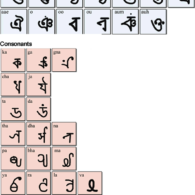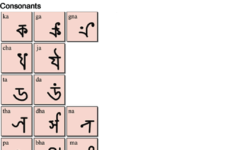Profile
Konda-Dora is one of nearly twenty scripts created by Dr. Prasanna Sree for indigenous and minority groups, mostly in Andhra Pradesh. She writes:Konda-Dora is a Dravidian language spoken in the Indian state of Andhra Pradesh, Assam and Odisha by about 28,000 people. The Konda-Dora are a Scheduled Tribe and are distributed in the Agency Area of the Visakhapatnam, Vizianagaram, Srikakulam and East Godavari districts. They call themselves Pandava Doras or Pandava Rajas. They believe that they are the descendants of the Pandavas of the Mahabharata. Etymologically konda means hill, and dora means headman or chieftain, hence Konda-Dora means hill chieftain.
The Konda-Dora language, which is also known as Kubi, is closely related to the Kui language of the Khond, and has borrowed vocabulary from Odia and Telugu. Many Konda-Dora speak Telugu as well as or instead of their native language.
The Konda Dora tribe is divided into a number of clans such as Korra, Killo, Swabi, Ontalu, Kimud, Pangi, Paralek, Mandelek, Bidaka, Somelunger, Surrek, Goolurigune, and Oljukula.
Levirate type of marriage is customarily practiced in this community. Polygyny is also in vogue. Marriage by capture, elopement, negotiations and service are traditionally accepted ways of acquiring mates. Divorce is socially permitted. They eat beef and pork.
They are basically shifting cultivators, but they are adopting to settled cultivation. They collect and sell non-timber forest products. They perform the famous community dance called Dimsa during the Vetting festival, and on marriage occasions. The traditional musical instruments used are Tudum, Dappu, Kiridi and Pirodi.
In the traditional panchayat council led by the headman, or guruvakadu, the cases such as divorce, minor civil fights and minor social disputes are dealt with, and the decision of the headman is final.
You can help support our research, education and advocacy work. Please consider making a donation today.


